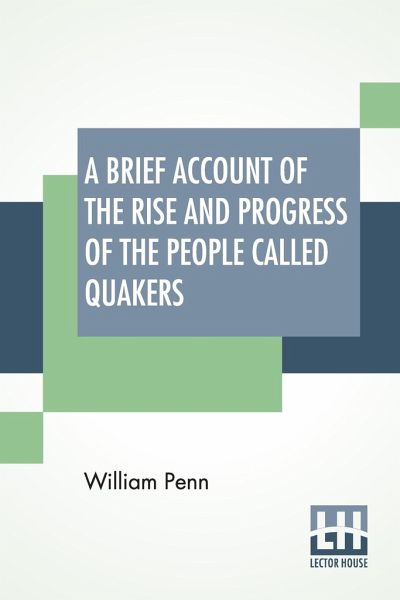
A Brief Account Of The Rise And Progress Of The People Called Quakers
In Which Their Fundamental Principle, Doctrines, Worship, Ministry, And Discipline, Are Plainly Declared. With A Summary Relation Of The Former Dispensations Of God In The World; By Wa
Versandkostenfrei!
Versandfertig in 1-2 Wochen
10,99 €
inkl. MwSt.

PAYBACK Punkte
5 °P sammeln!
NEW PRINT WITH PROFESSIONAL TYPE-SET IN CONTRAST TO SCANNED PRINTS OFFERED BY OTHERS A Brief Account Of The Rise And Progress Of The People Called Quakers: In Which Their Fundamental Principle, Doctrines, Worship, Ministry, And Discipline, Are Plainly Declared. With A Summary Relation Of The Former Dispensations Of God In The World; By Way Of Introduction. This book is a result of an effort made by us towards making a contribution to the preservation and repair of original classic literature. In an attempt to preserve, improve and recreate the original content, we have worked towards: 1. Type-...
NEW PRINT WITH PROFESSIONAL TYPE-SET IN CONTRAST TO SCANNED PRINTS OFFERED BY OTHERS A Brief Account Of The Rise And Progress Of The People Called Quakers: In Which Their Fundamental Principle, Doctrines, Worship, Ministry, And Discipline, Are Plainly Declared. With A Summary Relation Of The Former Dispensations Of God In The World; By Way Of Introduction. This book is a result of an effort made by us towards making a contribution to the preservation and repair of original classic literature. In an attempt to preserve, improve and recreate the original content, we have worked towards: 1. Type-setting & Reformatting: The complete work has been re-designed via professional layout, formatting and type-setting tools to re-create the same edition with rich typography, graphics, high quality images, and table elements, giving our readers the feel of holding a 'fresh and newly' reprinted and/or revised edition, as opposed to other scanned & printed (Optical Character Recognition - OCR) reproductions. 2. Correction of imperfections: As the work was re-created from the scratch, therefore, it was vetted to rectify certain conventional norms with regard to typographical mistakes, hyphenations, punctuations, blurred images, missing content/pages, and/or other related subject matters, upon our consideration. Every attempt was made to rectify the imperfections related to omitted constructs in the original edition via other references. However, a few of such imperfections which could not be rectified due to intentional\unintentional omission of content in the original edition, were inherited and preserved from the original work to maintain the authenticity and construct, relevant to the work. We believe that this work holds historical, cultural and/or intellectual importance in the literary works community, therefore despite the oddities, we accounted the work for print as a part of our continuing effort towards preservation of literary work and our contribution towards the development of the society as a whole, driven by our beliefs. We are grateful to our readers for putting their faith in us and accepting our imperfections with regard to preservation of the historical content. HAPPY READING!



![The History of the Rise, Increase, and Progress of the Christian People Called Quakers [microform]: Intermixed With Several Remarkable Occurences, Wri Cover The History of the Rise, Increase, and Progress of the Christian People Called Quakers [microform]: Intermixed With Several Remarkable Occurences, Wri](https://bilder.buecher.de/produkte/66/66134/66134071n.jpg)
![A Memoir of the Late Rev. William Black, Wesleyan Minister, Halifax, N.S. [microform]: Including an Account of the Rise and Progress of Methodism in N Cover A Memoir of the Late Rev. William Black, Wesleyan Minister, Halifax, N.S. [microform]: Including an Account of the Rise and Progress of Methodism in N](https://bilder.buecher.de/produkte/66/66201/66201024n.jpg)
![The History of Methodism in Canada [microform]: With an Account of the Rise and Progress of the Work of God Among the Canadian Indian Tribes and Occas Cover The History of Methodism in Canada [microform]: With an Account of the Rise and Progress of the Work of God Among the Canadian Indian Tribes and Occas](https://bilder.buecher.de/produkte/66/66138/66138406n.jpg)
![A Candid Narrative of the Rise and Progress of the Herrnhuters [microform]: Commonly Call'd Moravians or Unitas Fratrum, With a Short Account of Their Cover A Candid Narrative of the Rise and Progress of the Herrnhuters [microform]: Commonly Call'd Moravians or Unitas Fratrum, With a Short Account of Their](https://bilder.buecher.de/produkte/65/65625/65625268n.jpg)


![The Rise of the Quakers [microform] Cover The Rise of the Quakers [microform]](https://bilder.buecher.de/produkte/66/66119/66119934n.jpg)

![Essays on the Rise and Progress of the Christian Religion in the West of Europe [microform]: From the Reign of Tiberius to the End of the Council of T Cover Essays on the Rise and Progress of the Christian Religion in the West of Europe [microform]: From the Reign of Tiberius to the End of the Council of T](https://bilder.buecher.de/produkte/65/65522/65522119n.jpg)
